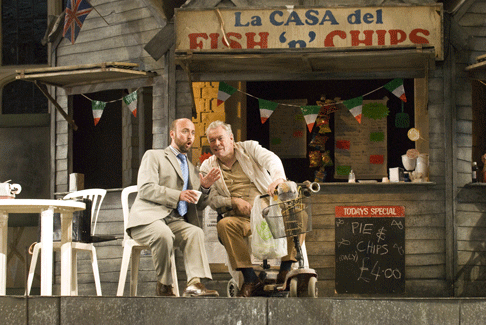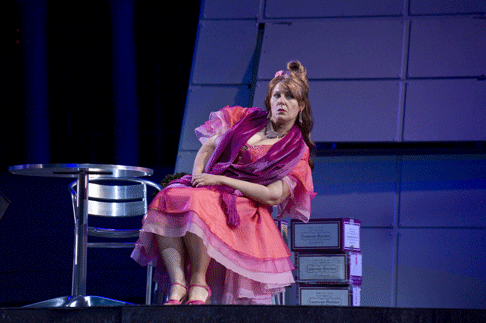20 Jun 2011
Don Pasquale, Opera Holland Park
As it turned out, it was a mild and mainly dry evening.

As it turned out, it was a mild and mainly dry evening.
Opera festivals — indeed, all outdoor or semi-outdoor activities — in the UK are in thrall to the vagaries of the weather, and as I write this review in early June I am sitting in my living-room, listening to the rain battering on the window and hoping it might clear up by the time I have to go to Glyndebourne in two days’ time.
For Opera Holland Park, whose theatre is ultimately a tent (albeit a highly sophisticated one) in which the sounds and light quality of the outside world are an inevitable part of the show, director Stephen Barlow has harnessed the characteristic changeable gloom of the British summer to create a modern and very British Don Pasquale that will resonate with anybody used to taking seaside holidays in this country. It is an ingenious treatment, finely honed by the work of lighting designer Mark Jonathan, which I cannot imagine would work as well in any other theatre. It almost made a virtue of the frequent noises-off from aeroplanes passing overheard and children playing elsewhere in the park.
The opera is sung in the original Italian, and Pasquale’s drab, tatty beach café is arbitrarily Italian (in the surtitles, Pasquale refers to it throughout as his ‘casa’). Its menu, however, consists of fish and chips or pie and mash, and there is no question that we are on the British coast — a world of striped awnings, deckchairs for hire, pensioners picnicking on benches with home-made sandwiches and a Thermos. Crucially, it’s the world of another phenomenon with its roots in Italian culture but adopted by the British as their own — the end-of-pier Punch and Judy show, an idea which, while never overtly suggested, Barlow recreates in spirit with a staging which served this peculiarly mean-spirited opera well with a combination of broad visual comedy and vicious humour.
None of the characters in Don Pasquale are obviously sympathetic. Even Ernesto, for all he’s been given the best of Donizetti’s lyrical melody to in which to bewail his uncle’s attempt to disinherit him, is ultimately a lazy freeloader who has grown too used to taking advantage of his old uncle’s generosity. While Pasquale is unquestionably in need of being taught a lesson in respect of his view of women, the bullying he suffers at the hands of everybody else in the cast goes much too far and you can’t help but feel sorry for the old man. It’s cynical, cruel and unashamedly selfish.
The visual humour was plentiful, with some laugh-out-loud moments. The fresh-from-the-convent “Sofronia” whipped off a full nun’s habit to reveal a sexy scarlet number, and in Act 3 was “revealed” in a more grotesquely extravagant get-up still, draped across the counter of her newly refurbished “Café Corneti” like a swimwear model across the bonnet of a sports car.
 Donald Maxwell as Don Pasquale and Richard Burkhard as Dr Malatesta
Donald Maxwell as Don Pasquale and Richard Burkhard as Dr Malatesta
Meanwhile, a series of peripheral gags involving walk-on characters from the chorus further highlighted the general tone of the production. Don Pasquale’s outdated attitudes are underlined by his gleefully lascivious reaction to the sight of two scantily-clad young lady joggers, and disapproving glances towards a male gay couple with a baby (they are later revealed not to be a couple at all, but the partners of the joggers). Meanwhile, a casual user of a coin-operated telescope on the seafront has his gaze distracted by the sight of the snazzily-attired Norina provocatively applying sun lotion to her décolleté, much to the annoyance of his long-suffering pregnant wife.
Top vocal honours went to the Ernesto, the South African tenor Colin Lee who is now deservedly enjoying a high-profile international career. He has a personable stage presence, and a voice at the more substantially rounded end of the flexible bel canto tenor spectrum, with bright liquid tone which pings right to the back of the auditorium. In the title role, opera buffa veteran Donald Maxwell was highly entertaining when the action demanded, but on the whole he was more sympathetic and genuine than most, offering a rare degree of balance. Richard Burkhard’s Malatesta had a well-schooled voice and engaging personality.
 Majella Cullagh as Norina
Majella Cullagh as Norina
I have admired Majella Cullagh in numerous Donizetti roles in the past, but sadly felt that she was miscast as Norina; her light, vinegary soprano did open up somewhat as the evening progressed, but she remained overpowered by her colleagues during the ensembles. And as spirited and entertaining as her performance was, she made rather a matronly heroine — believable perhaps as the scheming merry widow (there’s no reason at all why Ernesto’s lover shouldn’t be somewhat older than him), but hardly convincing as the nubile young bride who the lecherous Pasquale believes is the embodiment of his fantasies.
In the pit was bel canto’s supreme champion, Richard Bonynge, looking spry and conducting with poised lyricism.
All in all a strong, entertaining and memorable opening to Opera Holland Park’s 2011 season, and one which turns this unique theatre’s many idiosyncrasies to its advantage. One of next year’s operas is Falstaff, which has immense potential in a theatre which loses natural daylight as the performance progresses; let us hope the director makes the most of it.
Ruth Elleson © 2011